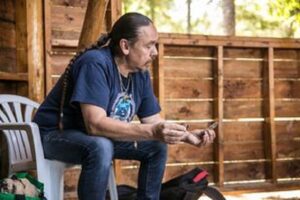Anishinaabe Elder shares teachings on naming ceremonies

By Sam Laskaris
NIPISSING FIRST NATION – It took Perry McLeod-Shabogesic about two decades to receive his spirit name.
But now, McLeod-Shabogesic, a member of Nipissing First Nation, is heavily involved with the selection of spirit names for plenty of others.
He hosted a virtual teaching on Zoom on Jan. 9 to provide details about naming ceremonies.
“I was always aware of this other name that people would use to introduce themselves,” McLeod-Shabogesic said. “Even on TV you hear those movies and such where you hear the names of some of our Indigenous Chiefs – Sitting Bull, Crazy Horse – and I thought that they were very unique names and I thought being Anishinaabe, we must have names, too, but wondered if we did as a youngster.”
McLeod-Shabogesic, an Elder and helper in many First Nations in the Lake Huron region, did not receive his spirit name – Anzoked, meaning one who tells stories – until later in his life.
“I didn’t receive my name until I was in my late teens or early twenties,” said McLeod-Shabogesic, who is the director of cultural services at Niijaaninaanik Child & Family Services in Dokis First Nation. “And by this time, I had begun to understand how important this was, but I didn’t realize just how important it was to me until it was announced to me.”
His spirit name was announced by his uncle and his aunt.
“They saw that in me,” he said. “They saw at the time I was very inquisitive about our history as Nipissings, about our medicine, about our teachings. I was always annoying the Elders, asking questions, just wanting to know more. They saw that in me and said that’s his name.”
McLeod-Shabogesic said different Nations have different teachings, but the Anishinaabe teaching is that everyone has a spirit name. And that name is given to one by the Creator even before being born.
“Everyone receives that name at some point,” he said.
Some individuals receive their spirit name early on in life.
“When a child was born, others would pay attention to that child and what was happening around that child,” McLeod-Shabogesic said. “Usually, there was some kind of a sign, something would show itself that would relate to the name of that child, that spirit that is within that child’s vessel, that body of the baby. And that name would then be identified through the older people, not always, but usually.”
McLeod-Shabogesic also said one’s spirit name is rather important.
“We refer to it as our very first bundle,” he said. “And our spirit receives that bundle before we are born.”
He also said other things given by the Creator include one’s clan and language. Individuals also choose their family as well.
McLeod-Shabogesic also said it is not uncommon for some to have more than one spirit name.
“Sometimes you receive one name,” he said. “Sometimes the work that comes with that name is finished and you may receive another name. There’s no hard [and] fast rule about names. Sometimes you will carry that name for your whole life. Someone else might have one, two, three names. Some of them carry two names at once.”
McLeod-Shabogesic added individuals are not allowed to select their own name.
“Everybody wants to be Soaring Eagle,” he said. “But it doesn’t work that way. Names come the way names come. And there is beauty in whatever name that you carry.”


